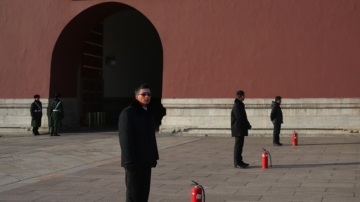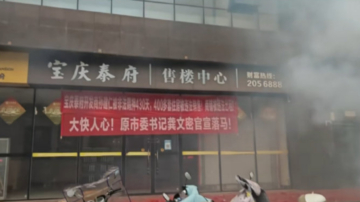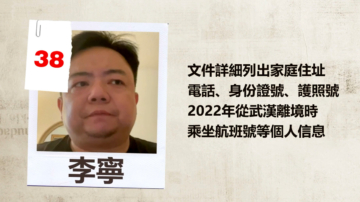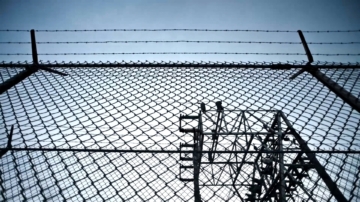【新唐人2014年04月09日讯】近年来,大陆各地医患矛盾日益尖锐,暴力冲突频发。发生在去年10月25号的浙江“温岭杀医案”,更是一度将医患关系推上了舆论的风口浪尖。日前,“温岭杀医案”在浙江台州进行了二审公开审判,被告上诉被驳回,维持一审死刑判决。数十万网民因此投入一场医患关系的热烈讨论。
浙江省高级人民法院在4月1号对“温岭杀医案”进行了二审公开宣判,法庭驳回被告人连恩青的上诉,维持一审死刑判决。
二审判决结果一公开,民众纷纷指责法院对连恩青量刑过重。
造成1死2伤的“温岭杀医案”,今年1月22号,检方以故意杀人罪起诉连恩青,虽然辩护律师表示连恩青有精神疾病,但他自己否认。
大陆东南大学法学院教授张赞宁:“可以适当的考虑(精神病),对杀人者在量刑的时候适当从轻。但是我是绝对反对杀医的,但是一旦发生了,法院不应当变作一人堂,如果他确实有精神障碍的问题,那应当是免除死刑的。”
2012年3月20号,连恩青为了治疗鼻炎,在温岭市人民医院做了手术,术后几个月他感觉自己的病情没有好转,反而加重,为了解决问题,他多次投诉医院,寻找主治医生,要求治好他的病,医院也曾组织院内、院外的专家会诊,期间出具的种种医学数据都显示手术成功,没有再做手术的必要,但连恩青并不认可。
连恩青在二审判决后第二天,接受《央视》独家专访。连恩青表示,自己之所以杀人,是希望以这种方式把医院的黑幕揭露出来,让有同样遭遇的人可以得到应有的治疗。当记者问到连恩青是否认为自己做错了时,连恩青回答:我无悔,只有遗憾,我没能揭露它那用虚假谎言所掩盖的面纱。
专访播出后,引发巨大争议,网站评论人数短短几天达到了10万以上。
大部分观点认为,医患纠纷的发生,更多责任在于院方,而不是患者。其中,医疗事故频发、医生医德缺失、收回扣、收红包、开贵药、假药等等医疗腐败和黑幕,都是造成医患矛盾的主要原因。而执法不公又使得医方责任很难被追究,造成矛盾进一步升级,最终爆发。
但也有观点认为,医患矛盾责任不仅仅在于医院或医护人员本身,更多的责任应当归结于医疗保障制度不合理、医疗行业市场化等制度性问题。
张赞宁:“我们国家对医保投入实在是太少太少了,一旦治疗失败,往往对病人产生了人财两空的结局,这个对病人是难接受的。如果政府对医保的投入高一点,至少不要对病人造成人财两空的局面,那么这个矛盾可能就不会那么尖锐,就不会去杀医,所以这个还是个制度性问题。”
张赞宁指出,政府将原本属于公共服务领域的医疗行业进行市场化,是造成医疗腐败的主要原因,同时也将矛盾转嫁给了医疗机构和医务人员。
张赞宁:“改革开放30年,把医疗这一块推向了市场,这是一个极大的错误。任何一个国家医疗都不是一个市场,都是靠国家为主要投入的,但是我们大陆医疗它作为一个市场来做,这样就产生了医生多检查、多下药、下贵药。我想这么少的医疗保险的投入,实际上是把民众与政府之间的矛盾就转嫁到了医院和医生的头上。”
此外,也有评论指出,在中国大陆,除了医患冲突,教育、科技、文化等多个领域都在发生着同样的矛盾和纠纷,社会整体道德下滑、信任度不足、个体的暴戾化倾向都在加剧整个社会的暴力。
张赞宁:“我们党文化历来教育民众要仇恨的,甚么牢记阶级苦,不忘血泪仇。这个党文化的教育都是仇恨的,血腥的、冷漠的。”
令人遗憾的是,民间和专家学者提出的解决医患矛盾建议,并没有引起重视,浙江当局出台的防范措施,仅仅是“增配医院安保人员”。
采访编辑/张天宇 后制/李勇
Doctoral Murder: One hundred thousand Internet users
accuse trial results
In recent years, acute contradictions and violence between
doctors and patients in China, occurs on a frequent basis.
Especially the "Wenling doctoral murder case" of last
Oct. 25 2013,
where the relationship between doctor and patient was
pushed to its breaking point.
Recently, this case was conducted in an open trial of second
instance in Taizhou, Zhejiang,
whereby the case is illustrated, proven or disproved.
The defendants appeal was dismissed.
The court upheld the death sentence. Hundreds of
thousands of Internet users joined in the lively
discussion of doctor-patient relationship.
On April 1, the Higher People's Court in Zhejiang conducted
a secondary trial on the "Wenling doctoral murder case".
The court rejected the defendant – Lian Enqing's appeal and
upheld the death sentence.
After the verdicts announcment, the public accused the
court for its heavy handed sentencing on Lian Enqing.
The "Wenling doctoral murder case" resulted in one
death and two injuries.
On Jan. 22 this year, the courts prosecuted
Lian Enqing with intentional homicide.
The defense lawyers said Lian Enqing had mental illness,
but Lian denied this.
Zhang Zanning, Law School professor from Southeast
University in China:
"This psychosis should be considered in the correct manner.
For instance, a lighter sentencing for Lian
I am against the killing of doctors. If this is allowed to go ahead,
the courts will become a unified church, one church.
If Lian does have a mental disorder, he should be exempt from
the death penalty."
On Mar. 20, 2012, Lian carried out a surgical procedure for the
treatment of rhinitis in Wenling People's Hospital.
A few months after the surgery, Lian felt his condition had
not made any improvement.
He made frequent complaints to the hospital, saying he wanted
another doctor to undertake the procedure again.
Yet the hospital arranged an expert analysis where
various medical data, showed the operation was a success.
It also claimed there was no need for further surgery,
Lian refuted this endorsement.
Lian Enqing accepted "CCTV's" exclusive interview the
day after the trial.
Lian said he'd hoped to expose the hospitals underhandedness
which eventually resulted in the death of the patient.
Lian hoped people with the same experiences can get
proper treatment in the future.
When a reporter asked whether he thought he had done wrong,
Lian replied: I have no regrets.
The only regret is that I could not reveal the hospitals
shady way of concealing the truth.
The interview caused enormous controversy. Internet
reviews reached a massive 10 million in just a few days.
According to the majority of reviews, the hospital should take
more responsibility on the occurrence of medical disputes,
instead of the patient.
The main causes for conflicts between doctors and patients,
include frequent malpractice,
a lack of medical ethics, kickbacks, expensive and fake drugs
and other medical corruptions.
The denial of justice also makes it difficult to investigate the
hospital concerned,
resulting in further escalation and outbreaks of conflict.
There are also points of view claiming it is the responsibility
of the medical profession,
to ease conflict between doctor and patient. In fact it goes
deeper than this.
More responsibility is attributable to the unreasonable
market-oriented health care system.
Zhang Zanning: "The investment in health care in our country
is way too little.
Once the treatment fails, the patient often has nothing left,
which is difficult for the patient to accept.
If the government put a little more emphasis upon health insurance,
the situation would rapidly change for the better for the patient.
We would then not see such sharp contradictions, including the
doctoral murder. This was an institutional problem."
Zhang Zaning pointed out that the government threw the
healthcare system into the market,
which originally belonged to the public service. This is the main
reason for health service corruption.
It also passed on this contradictory issue to the medical
institutions and medical personnel.
Zhang Zaning: "The 30 years'reform pushed the health care
system into the market, which is a big mistake.
Most of the health care systems in the world today, are mainly
invested in by the government.
However, the health care belongs to the market in China,
which leads to multiple checking, extensive and
expensive drugs.
Such little health insurance, actually passed on all the
contradictions between public and government,
onto the hospitals and doctors."
There are also comments which mentioned, in addition to
the conflict between doctor and patient,
the same conflicts and disputes existed in many fields in China,
such as education, science and culture, etc.
The moral decline, lack of trust and the tendency of violent
individuals, has exacerbated the violence in the whole of society.
Zhang Zanning: "The CCP culture has always been used to
educate the public to hate others,
such as to keep in mind the class pain, not forgetting the blood
and tears. The CCP culture is one of hatred, bloody and cold."
Many experts provided several solutions to the conflicts
between doctors and patients.
Regrettably, these solutions did not draw any attention.
The precautionary measures issued by Zhejiang authorities,
were merely put in place to add in the security guard.
More security, more suppression and more control.
Interview & Edit/Zhang Tianyu Post-Production/Li Yong
浙江省高级人民法院在4月1号对“温岭杀医案”进行了二审公开宣判,法庭驳回被告人连恩青的上诉,维持一审死刑判决。
二审判决结果一公开,民众纷纷指责法院对连恩青量刑过重。
造成1死2伤的“温岭杀医案”,今年1月22号,检方以故意杀人罪起诉连恩青,虽然辩护律师表示连恩青有精神疾病,但他自己否认。
大陆东南大学法学院教授张赞宁:“可以适当的考虑(精神病),对杀人者在量刑的时候适当从轻。但是我是绝对反对杀医的,但是一旦发生了,法院不应当变作一人堂,如果他确实有精神障碍的问题,那应当是免除死刑的。”
2012年3月20号,连恩青为了治疗鼻炎,在温岭市人民医院做了手术,术后几个月他感觉自己的病情没有好转,反而加重,为了解决问题,他多次投诉医院,寻找主治医生,要求治好他的病,医院也曾组织院内、院外的专家会诊,期间出具的种种医学数据都显示手术成功,没有再做手术的必要,但连恩青并不认可。
连恩青在二审判决后第二天,接受《央视》独家专访。连恩青表示,自己之所以杀人,是希望以这种方式把医院的黑幕揭露出来,让有同样遭遇的人可以得到应有的治疗。当记者问到连恩青是否认为自己做错了时,连恩青回答:我无悔,只有遗憾,我没能揭露它那用虚假谎言所掩盖的面纱。
专访播出后,引发巨大争议,网站评论人数短短几天达到了10万以上。
大部分观点认为,医患纠纷的发生,更多责任在于院方,而不是患者。其中,医疗事故频发、医生医德缺失、收回扣、收红包、开贵药、假药等等医疗腐败和黑幕,都是造成医患矛盾的主要原因。而执法不公又使得医方责任很难被追究,造成矛盾进一步升级,最终爆发。
但也有观点认为,医患矛盾责任不仅仅在于医院或医护人员本身,更多的责任应当归结于医疗保障制度不合理、医疗行业市场化等制度性问题。
张赞宁:“我们国家对医保投入实在是太少太少了,一旦治疗失败,往往对病人产生了人财两空的结局,这个对病人是难接受的。如果政府对医保的投入高一点,至少不要对病人造成人财两空的局面,那么这个矛盾可能就不会那么尖锐,就不会去杀医,所以这个还是个制度性问题。”
张赞宁指出,政府将原本属于公共服务领域的医疗行业进行市场化,是造成医疗腐败的主要原因,同时也将矛盾转嫁给了医疗机构和医务人员。
张赞宁:“改革开放30年,把医疗这一块推向了市场,这是一个极大的错误。任何一个国家医疗都不是一个市场,都是靠国家为主要投入的,但是我们大陆医疗它作为一个市场来做,这样就产生了医生多检查、多下药、下贵药。我想这么少的医疗保险的投入,实际上是把民众与政府之间的矛盾就转嫁到了医院和医生的头上。”
此外,也有评论指出,在中国大陆,除了医患冲突,教育、科技、文化等多个领域都在发生着同样的矛盾和纠纷,社会整体道德下滑、信任度不足、个体的暴戾化倾向都在加剧整个社会的暴力。
张赞宁:“我们党文化历来教育民众要仇恨的,甚么牢记阶级苦,不忘血泪仇。这个党文化的教育都是仇恨的,血腥的、冷漠的。”
令人遗憾的是,民间和专家学者提出的解决医患矛盾建议,并没有引起重视,浙江当局出台的防范措施,仅仅是“增配医院安保人员”。
采访编辑/张天宇 后制/李勇
Doctoral Murder: One hundred thousand Internet users
accuse trial results
In recent years, acute contradictions and violence between
doctors and patients in China, occurs on a frequent basis.
Especially the "Wenling doctoral murder case" of last
Oct. 25 2013,
where the relationship between doctor and patient was
pushed to its breaking point.
Recently, this case was conducted in an open trial of second
instance in Taizhou, Zhejiang,
whereby the case is illustrated, proven or disproved.
The defendants appeal was dismissed.
The court upheld the death sentence. Hundreds of
thousands of Internet users joined in the lively
discussion of doctor-patient relationship.
On April 1, the Higher People's Court in Zhejiang conducted
a secondary trial on the "Wenling doctoral murder case".
The court rejected the defendant – Lian Enqing's appeal and
upheld the death sentence.
After the verdicts announcment, the public accused the
court for its heavy handed sentencing on Lian Enqing.
The "Wenling doctoral murder case" resulted in one
death and two injuries.
On Jan. 22 this year, the courts prosecuted
Lian Enqing with intentional homicide.
The defense lawyers said Lian Enqing had mental illness,
but Lian denied this.
Zhang Zanning, Law School professor from Southeast
University in China:
"This psychosis should be considered in the correct manner.
For instance, a lighter sentencing for Lian
I am against the killing of doctors. If this is allowed to go ahead,
the courts will become a unified church, one church.
If Lian does have a mental disorder, he should be exempt from
the death penalty."
On Mar. 20, 2012, Lian carried out a surgical procedure for the
treatment of rhinitis in Wenling People's Hospital.
A few months after the surgery, Lian felt his condition had
not made any improvement.
He made frequent complaints to the hospital, saying he wanted
another doctor to undertake the procedure again.
Yet the hospital arranged an expert analysis where
various medical data, showed the operation was a success.
It also claimed there was no need for further surgery,
Lian refuted this endorsement.
Lian Enqing accepted "CCTV's" exclusive interview the
day after the trial.
Lian said he'd hoped to expose the hospitals underhandedness
which eventually resulted in the death of the patient.
Lian hoped people with the same experiences can get
proper treatment in the future.
When a reporter asked whether he thought he had done wrong,
Lian replied: I have no regrets.
The only regret is that I could not reveal the hospitals
shady way of concealing the truth.
The interview caused enormous controversy. Internet
reviews reached a massive 10 million in just a few days.
According to the majority of reviews, the hospital should take
more responsibility on the occurrence of medical disputes,
instead of the patient.
The main causes for conflicts between doctors and patients,
include frequent malpractice,
a lack of medical ethics, kickbacks, expensive and fake drugs
and other medical corruptions.
The denial of justice also makes it difficult to investigate the
hospital concerned,
resulting in further escalation and outbreaks of conflict.
There are also points of view claiming it is the responsibility
of the medical profession,
to ease conflict between doctor and patient. In fact it goes
deeper than this.
More responsibility is attributable to the unreasonable
market-oriented health care system.
Zhang Zanning: "The investment in health care in our country
is way too little.
Once the treatment fails, the patient often has nothing left,
which is difficult for the patient to accept.
If the government put a little more emphasis upon health insurance,
the situation would rapidly change for the better for the patient.
We would then not see such sharp contradictions, including the
doctoral murder. This was an institutional problem."
Zhang Zaning pointed out that the government threw the
healthcare system into the market,
which originally belonged to the public service. This is the main
reason for health service corruption.
It also passed on this contradictory issue to the medical
institutions and medical personnel.
Zhang Zaning: "The 30 years'reform pushed the health care
system into the market, which is a big mistake.
Most of the health care systems in the world today, are mainly
invested in by the government.
However, the health care belongs to the market in China,
which leads to multiple checking, extensive and
expensive drugs.
Such little health insurance, actually passed on all the
contradictions between public and government,
onto the hospitals and doctors."
There are also comments which mentioned, in addition to
the conflict between doctor and patient,
the same conflicts and disputes existed in many fields in China,
such as education, science and culture, etc.
The moral decline, lack of trust and the tendency of violent
individuals, has exacerbated the violence in the whole of society.
Zhang Zanning: "The CCP culture has always been used to
educate the public to hate others,
such as to keep in mind the class pain, not forgetting the blood
and tears. The CCP culture is one of hatred, bloody and cold."
Many experts provided several solutions to the conflicts
between doctors and patients.
Regrettably, these solutions did not draw any attention.
The precautionary measures issued by Zhejiang authorities,
were merely put in place to add in the security guard.
More security, more suppression and more control.
Interview & Edit/Zhang Tianyu Post-Production/Li Yong








